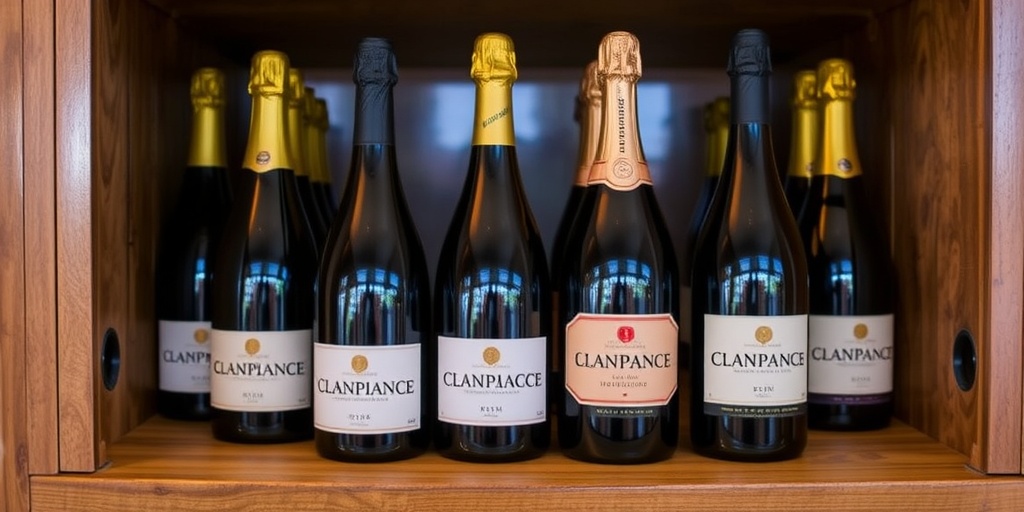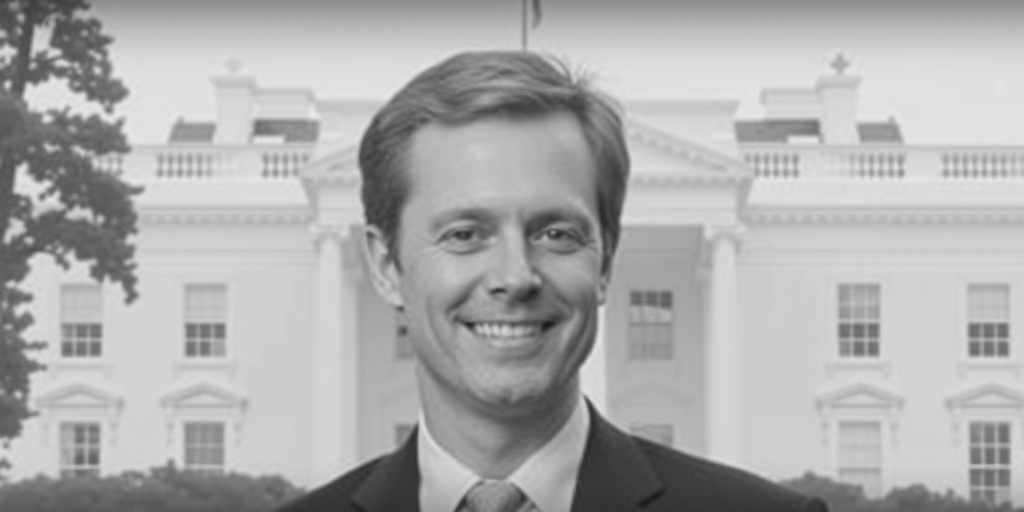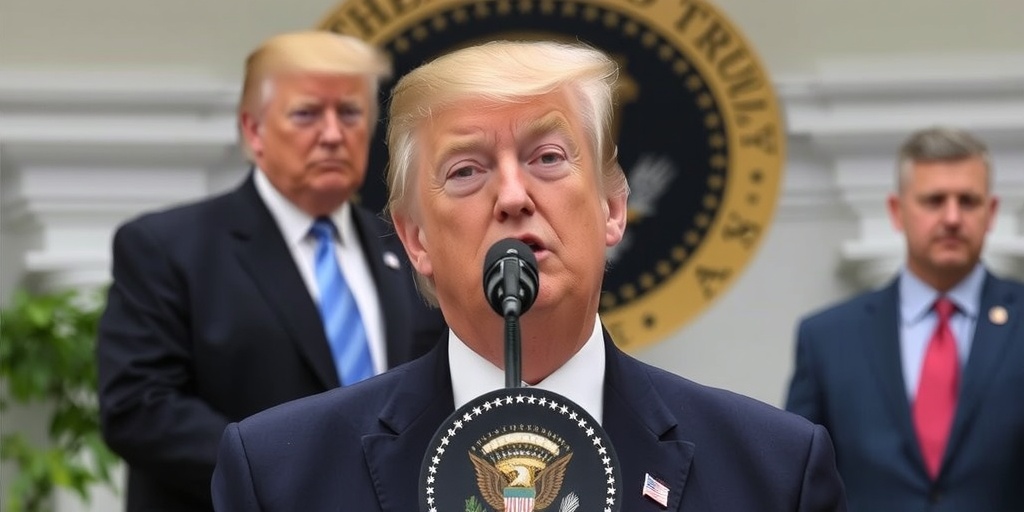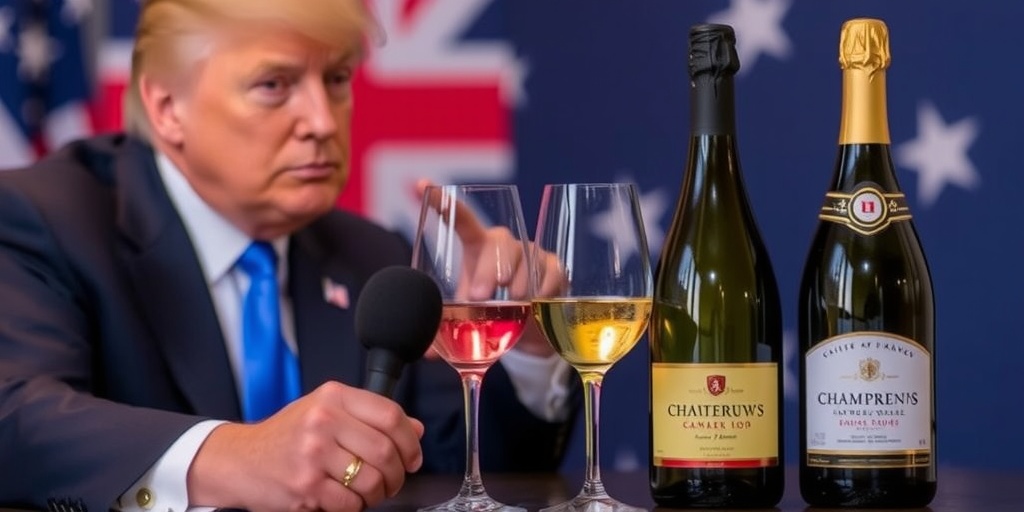Now Reading: Trump’s Tariff Threat Shakes French Wine and Champagne Producers
-
01
Trump’s Tariff Threat Shakes French Wine and Champagne Producers
Trump’s Tariff Threat Shakes French Wine and Champagne Producers

Title: French Winemakers React to Proposed 200% Tariffs on Wine and Spirits by U.S. President Trump
In a significant escalation in trade tensions, President Donald Trump recently threatened to impose staggering 200 percent tariffs on European wines, Champagne, and spirits, sending shockwaves throughout the French wine industry. This drastic measure has raised serious concerns among producers large and small, potentially crippling one of France’s most vital export markets—the United States.
Gabriel Picard, the chairman of the Federation of Wine and Spirits Exporters, noted the severe implications of such tariffs, stating, “A 200 percent tax on European wines and spirits would mean an immediate halt to all shipments to the United States.” His estimates indicate that this tariff could result in an almost €4 billion loss in the French trade balance for “zero gain.” The enormity of the proposed tariffs left many in the wine community in disbelief.
Laurent Delaunay, the president of the Burgundy Interprofessional Wine Bureau, expressed profound concern, remarking, “We are in shock. The tariffs would be catastrophic if imposed.” He highlighted the longstanding business relationships that French winemakers have established with American importers, emphasizing that the U.S. is the largest market for French wines.
Champagne producers, including the two biggest associations in the region, found themselves momentarily speechless in light of the announcement. They emphasized their inability to provide immediate comments but shared the sentiment of uncertainty regarding their business viability with American importers. The prospect of such high tariffs left producers anxious about whether American importers would absorb these costs or pass them on to consumers.
François Huré, who manages a small Champagne house called Huré Frères alongside his brother, stated, “A 200 percent tariff is a lot; it would kill the business totally.” He mentioned that while some U.S. distributors had prepared for potential 25 percent tariffs, the reality of facing tariffs in triple digits was unfathomable. “Our buyers today, our distributors in the United States would cancel their orders because they won’t be able to afford it,” he lamented. This sentiment was echoed broadly, with many in the industry indicating that such tariffs would severely restrict the Champagne sector’s growth.
Huré further explained that the tax would effectively double the price of Champagne in the U.S. market. He illustrated this by saying, “If Champagne doubles from $60, who will pay $120? No one. Except maybe the super-rich. But that’s not enough to run an industry on.” The potential price hike could drive away average consumers and deter them from purchasing French products.
In terms of sheer volume, the impact of such tariffs would be significant. The United States accounted for 25 million to 26 million bottles of Champagne shipped from France last year, with the sector valued at approximately €3.9 billion in total exports to the U.S. for 2024 alone—a quarter of France’s total wine exports.
Moreover, the United States is not only the largest market for Champagne but also for Bordeaux wines, according to the Bordeaux Wine Council. The Cognac sector, which plays a monumental role in France’s economy, generates around 70,000 jobs, further emphasizing the potential fallout from proposed tariffs.
European spirits producers also expressed concerns, worried about being ensnared in ongoing trade disputes. SpiritsEurope, an industry lobby, urged both the European Union and the United States to separate their disputes from the spirits sector. Following Trump’s tariff announcement, the group issued a call for an end to the cycle of retaliatory actions between the U.S. and the EU, emphasizing that “reimposing tariffs would be a step backward—hurting businesses, workers, and consumers on both sides.”
France’s Foreign Trade Minister, Laurent Saint-Martin, condemned Trump’s announcement, signaling that France would not be yielding to threats. He stated on social media platform X that the U.S. president was escalating an already tense trade war, showcasing the deep fissures that could emerge from such aggressive policy changes.
As the French wine industry braces for potential fallout, producers on both sides of the Atlantic are left to navigate this uncertain future. The looming threat of 200 percent tariffs not only endangers a cherished cultural product but also jeopardizes the economic livelihoods tied to the revered tradition of French winemaking. As the situation unfolds, the call for dialogue and resolution will be ever more critical to avoid a trade calamity that could irreparably harm both French producers and American consumers alike.
Stay Informed With the Latest & Most Important News
Previous Post
Next Post
-
 01New technology breakthrough has everyone talking right now
01New technology breakthrough has everyone talking right now -
 02Unbelievable life hack everyone needs to try today
02Unbelievable life hack everyone needs to try today -
 03Fascinating discovery found buried deep beneath the ocean
03Fascinating discovery found buried deep beneath the ocean -
 04Man invents genius device that solves everyday problems
04Man invents genius device that solves everyday problems -
 05Shocking discovery that changes what we know forever
05Shocking discovery that changes what we know forever -
 06Internet goes wild over celebrity’s unexpected fashion choice
06Internet goes wild over celebrity’s unexpected fashion choice -
 07Rare animal sighting stuns scientists and wildlife lovers
07Rare animal sighting stuns scientists and wildlife lovers




















